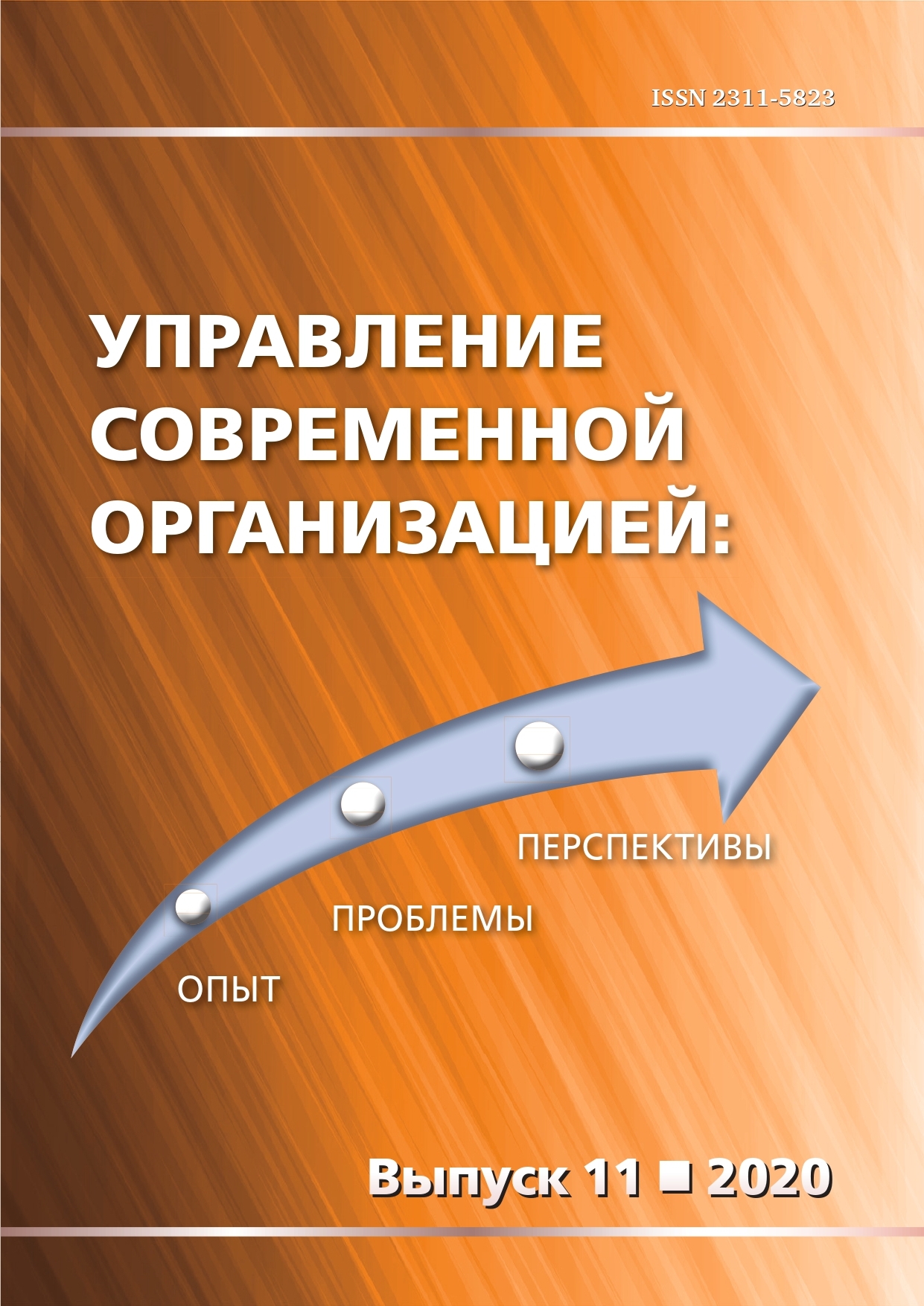USING FRACTALS AS AN ORGANIZATIONAL DESIGN TOOL A STRUCTURE THAT IS RECEPTIVE TO INNOVATION JEL: М 10, О21. УДК: 334.021
Main Article Content
Abstract
An approach to using fractals for designing, analyzing, and selecting models of organizational structures is Proposed. The advantages of such a structure, designed using the fractal methodology, are due to the adaptability of branched fractals, especially the focus on the self-development of subordinate fractals (divisions of organizations, branches, etc.). A fractal structure, unlike a bureaucratic one, promotes economic efficiency and self-organization, as well as achieving a competitive advantage.
Downloads
Download data is not yet available.
Article Details
How to Cite
Mezhova L. USING FRACTALS AS AN ORGANIZATIONAL DESIGN TOOL A STRUCTURE THAT IS RECEPTIVE TO INNOVATION // Управление современной организацией: опыт, проблемы и перспективы, 2020. Vol. 11, № 1. P. 20-24. URL: http://journal.asu.ru/mmo/article/view/9020.
Section
Управление организацией в инновационной экономике
References
Кочеткова А. (2003). Введение в организационное поведение. М., С. 184–195. [Kochetkova, A. Introduction to organizational behavior, Moscow, 2003, pp. 184–195. (In Russian)].
Кочеткова А. (2006). Фрактальный прорыв // Бизнес-журнал. № 14. [Kochetkova, A. (2006). Fractal breakthrough. Business magazine, No. 14. (In Russian)].
Межова Л. Н. (2008). Инновации в совершенствовании организационных структур на основе использования фракталов // Человек в мире экономических и правовых отношений: материалы региональной научно-практической конференции / Под ред. А. Н. Мельникова. Барнаул: Азбука. С. 191–194. [Mezhova, L. N. (2008). Innovations in improving organizational structures based on the use of fractals. Man in the world of economic and legal relations: materials of the regional scientific and practical conference / ed. by A. N. Melnikov. Barnaul: Azbuka, pp. 191–194. (In Russian)].
Русинов Р. К., Ядыкина Н. В., Сажина Т. Ю. (2012). Фрактальная модель образовательной среды (на примере вуза) // Информационная среда вуза XXI века: материалы международной научно-практической конференции, 4–10 дек. 2012, Коупио (Финляндия). URL: http://it2012.petrsu.ru/publication. php. [Rusinov, R. K., Yadykina, N. V., Sazhina, T. Yu. (2012). Fractal model of the educational environment (on the example of a University). Information environment of the University of the XXI century: Materials of the international scientific and practical conference, 4–10 Dec., Kopio (Finland). URL: http://it2012.petrsu. ru/publication. php. (In Russian)].
Тишин А. И., Эгембердиев Т. М. (2017). Фрактальность человека // Самоорганизация устойчивых целостностей в природе и обществе: материалы V Всероссийского постоянно действующего научного семинара. URL: http://sins.xaoc.ru/articles/articles_r017. html. [Tishin, A. I., Egemberdiev, T. M. (2017). Human Fractality. Self-Organization of stable integrity in nature and society: Materials of the V all-Russian permanent scientific seminar. URL: http://sins.xaoc.ru/articles/articles_r017. html. (In Russian)].
Чекулаев М. В. (2002). Фрактальное предприятие — новое измерение менеджмента // Менеджмент сегодня: материалы конференции, 5 июня 2002 г. Издательский дом Гребенникова. URL: http://www. grebennikov.ru [Chekulaev, M. V. (2002). Fractal enterprise-a new dimension of management. Management today: Materials of the conference, June 5, 2002. Grebennikov publishing house. URL: http://www.grebennikov. ru (In Russian)].
Шпер В. Л. (2009). Фрактальные организации. Вести из Интернета // Методы менеджмента качества. Июнь, 2009. [Shper, V. L. (2009). Fractal organizations. News from the Internet. Quality management methods. June, 2009. (In Russian)].
Кочеткова А. (2006). Фрактальный прорыв // Бизнес-журнал. № 14. [Kochetkova, A. (2006). Fractal breakthrough. Business magazine, No. 14. (In Russian)].
Межова Л. Н. (2008). Инновации в совершенствовании организационных структур на основе использования фракталов // Человек в мире экономических и правовых отношений: материалы региональной научно-практической конференции / Под ред. А. Н. Мельникова. Барнаул: Азбука. С. 191–194. [Mezhova, L. N. (2008). Innovations in improving organizational structures based on the use of fractals. Man in the world of economic and legal relations: materials of the regional scientific and practical conference / ed. by A. N. Melnikov. Barnaul: Azbuka, pp. 191–194. (In Russian)].
Русинов Р. К., Ядыкина Н. В., Сажина Т. Ю. (2012). Фрактальная модель образовательной среды (на примере вуза) // Информационная среда вуза XXI века: материалы международной научно-практической конференции, 4–10 дек. 2012, Коупио (Финляндия). URL: http://it2012.petrsu.ru/publication. php. [Rusinov, R. K., Yadykina, N. V., Sazhina, T. Yu. (2012). Fractal model of the educational environment (on the example of a University). Information environment of the University of the XXI century: Materials of the international scientific and practical conference, 4–10 Dec., Kopio (Finland). URL: http://it2012.petrsu. ru/publication. php. (In Russian)].
Тишин А. И., Эгембердиев Т. М. (2017). Фрактальность человека // Самоорганизация устойчивых целостностей в природе и обществе: материалы V Всероссийского постоянно действующего научного семинара. URL: http://sins.xaoc.ru/articles/articles_r017. html. [Tishin, A. I., Egemberdiev, T. M. (2017). Human Fractality. Self-Organization of stable integrity in nature and society: Materials of the V all-Russian permanent scientific seminar. URL: http://sins.xaoc.ru/articles/articles_r017. html. (In Russian)].
Чекулаев М. В. (2002). Фрактальное предприятие — новое измерение менеджмента // Менеджмент сегодня: материалы конференции, 5 июня 2002 г. Издательский дом Гребенникова. URL: http://www. grebennikov.ru [Chekulaev, M. V. (2002). Fractal enterprise-a new dimension of management. Management today: Materials of the conference, June 5, 2002. Grebennikov publishing house. URL: http://www.grebennikov. ru (In Russian)].
Шпер В. Л. (2009). Фрактальные организации. Вести из Интернета // Методы менеджмента качества. Июнь, 2009. [Shper, V. L. (2009). Fractal organizations. News from the Internet. Quality management methods. June, 2009. (In Russian)].


 https://orcid.org/0000-0001-5819-4483
https://orcid.org/0000-0001-5819-4483